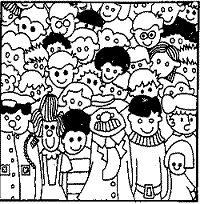| The Second Superpower | 2003-04-04 13:38 3 comments |
 by Flemming Funch by Flemming FunchJim Moore has an excellent article: The Second Superpower Rears its Beautiful Head and a new weblog. "As the United States government becomes more belligerent in using its power in the world, many people are longing for a "second superpower" that can keep the US in check. Indeed, many people desire a superpower that speaks for the interests of planetary society, for long-term well-being, and that encourages broad participation in the democratic process. Where can the world find such a second superpower? No nation or group of nations seems able to play this role, although the European Union sometimes seeks to, working in concert with a variety of institutions in the field of international law, including the United Nations. But even the common might of the European nations is barely a match for the current power of the United States.Great stuff. This article has gotten quite some attentionon the net in the past few days, and the meme seems to be taking hold. Moore somewhat equates the power he's talking about with the peace movement, which probably isn't necessary, although it is a good example. The key point is that there's a new mechanism at play here. "Thus the new superpower demonstrates a new form of "emergent democracy" that differs from the participative democracy of the US government. Where political participation in the United States is exercised mainly through rare exercises of voting, participation in the second superpower movement occurs continuously through participation in a variety of web-enabled initiatives. And where deliberation in the first superpower is done primarily by a few elected or appointed officials, deliberation in the second superpower is done by each individual—making sense of events, communicating with others, and deciding whether and how to join in community actions. Finally, where participation in democracy in the first superpower feels remote to most citizens, the emergent democracy of the second superpower is alive with touching and being touched by each other, as the community works to create wisdom and to take action."Count me in. Moore's article naturally also attracted some flak on the net. I'm not going to link to the few people who didn't like it. But it is always interesting to see who feels very threatened by subjects such as freedom, openness, self-organization, collective consciousness, leaderless organization, and that kind of thing. "Which brings us to the most important point: the vital role of the individual. The shared, collective mind of the second superpower is made up of many individual human minds—your mind and my mind—together we create the movement. In traditional democracy our minds don’t matter much—what matters are the minds of those with power of position, and the minds of those that staff and lobby them. In the emergent democracy of the second superpower, each of our minds matters a lot. For example, any one of us can launch an idea. Any one of us can write a blog, send out an email, create a list. Not every idea will take hold in the big mind of the second superpower—but the one that eventually catches fire is started by an individual. And in the peer-oriented world of the second superpower, many more of us have the opportunity to craft submissions, and take a shot."Finally Moore proposes a bit of the HOW in how we get there: "First, we need to become conscious of the "mental processes" in which we are involved as members of the second superpower, and explore how to make our individual sense-making and collective action more and more effective. This of course means challenging and improving the mass media, and supporting more interactive and less biased alternatives. But more ambitiously, we will need to develop a kind of meta-discipline, an organizational psychology of our community, to explore the nature of our web-enabled, person-centered, global governance and communication processes, and continue to improve them."It is all quote obvious, of course. Of course WE, the people of this planet, are the real power here. It is only because we're badly organized, badly informed, and communicating badly, that a very, very small percentage of us, who are better organized, can drag the rest of us around by the nose. What is going to change all of it is a form of organization that will ONLY work for all of us, and that will be of no use for the old power elite. You can call it self-organization, emergent democracy, the transparent society, the global brain, or whatever, but it is sure to make the old structures become gradually irrelevant once we get a better sense of it. It is a huge threat to the power elite, and to the traditional superpower(s), but the kicker is that it really makes no sense to them, so they will probably not succeed in suppressing it. They will try, but those attempts will look increasingly obvious and strange. |